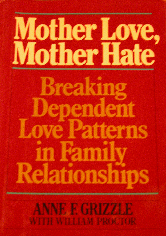

 |
Breaking Dependent Love Patterns in Family Relationships For most children and adults of any age, the relationship with their mothers is one of the most powerful they will experience, and the most fraught with conflict. By its very definition, the initial bond between mother and child is an intense one, | ||
with the mother responsible for fulfilling all of the helpless child’s needs at a time when the child cannot do so himself. But as that same child begins to struggle with his or her own independence, the caring and nurturing that was appropriate from the mother earlier can become stifling, overprotective and overwhelming. The stage is set for mother love to become mother hate, as the child resents his mother’s continued attempts to do for him when he needs to do for himself. In this book, Anne Grizzle shows that it is not just the mother who is responsible for the “dependent love pattern” but in fact the entire family. She offers sensible approaches to striking a healthy balance between love and independence in maternal relationships. Beginning with examples from her own practice and a series of self-tests, she helps the reader identify whether they are an over-dependent “adult child” or an overprotective parent. She goes on to describe the stages of dependent love and how they can culminate in the “perpetual child” – a child who never grows up, no matter what age. She also explores how apparently successful people can still be victimized by dependent love and how fathers can also “love too much.” But no matter how deeply ingrained these patterns have become, there is hope, and this book offers a variety of strategies that individuals can use, with or without their family’s cooperation, to break the pattern. Ranging from exploring family history to getting outside support, these are the tools that can help to unravel the dynamics that keep dependent love patterns active and to change them once they are understood. |
|||